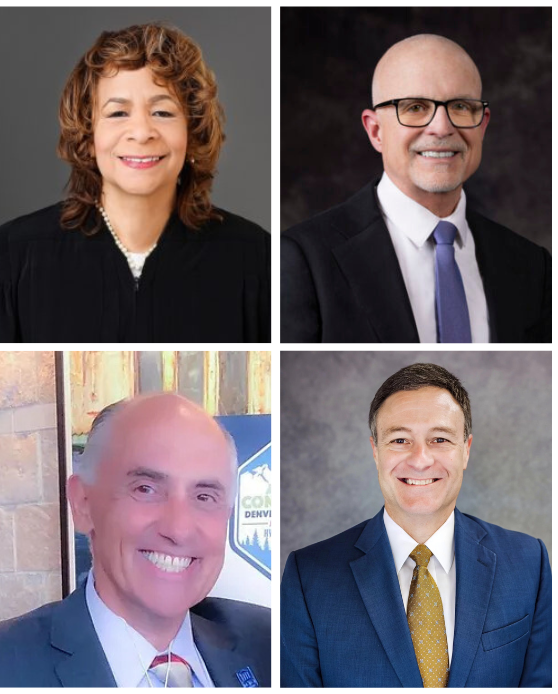2025 SVN Annual Conference Speakers and WorkshopsPlenary SpeakersGaelin Elmore
Nevaeh Gilmore
During high school, her involvement in the Family, Career, and Community Leaders of America (FCCLA) at both state and national levels sparked her desire to make a meaningful difference. Through this experience, she discovered her calling to support others, believing in the potential for beauty to emerge from even the darkest times. Today, Nevaeh feels privileged to work with survivors, guiding them in their journeys to transform pain into strength and take ownership of their stories. Her journey is a testament to resilience, and she continues to inspire hope, healing, and self-determination in those she serves.
Judicial Perspectives on Supervised Visitation: Balancing Safety, Fairness, and Family Bonds
The Honorable Judge Hiram E. Puig-Lugo (Ret) The Honorable Judge Victor Reyes (Ret) The Honorable Judge Robert Hofmann
WorkshopsIntroduction to Trauma and Resilience for Supervised Visitation Professionals You already know that your clients have experienced trauma, but did you realize that their trauma can have negative impacts across their lifetimes? Did you also know that resilience is NOT a fixed trait and can be grown every single day? This session provides crucial information about trauma, such as adverse childhood experiences, community violence, and vicarious trauma. But it also explores the buffering potential of positive childhood experiences, along with the components of resilience. Come learn about practical strategies you can teach clients in "micro-doses," and feel more effective at helping clients and children who are struggling. We guarantee that your brain will reward you with a brain chemical like serotonin or endorphins and you will feel good about the important work you do. Erase the Gap Belonging is an innate and fundamental need that we all have. It influences many of our decisions throughout any given day, whether we realize it or not. Research and experts have shown the exponential impact of genuine and authentic experiences of belonging. It can increase motivation, problem-solving, emotional, mental, and physical health, and resiliency, to name a few. Family, school, and community are widely discussed as the top three ways to develop youth experience and feel belonging.
Unfortunately, we also know that if a youth has experienced childhood adversity of any sort, their relationship with family, school, or community is often destroyed in the process; and sometimes all three. Adversity and trauma directly impact and sometimes eliminate experiences of belonging. I believe this is why we see such significant gaps and vicious cycles in youth and adult populations who have experienced childhood adversity and trauma. Backed by research and lived experience, this workshop is about how you can begin to erase the belonging gap for the youth you serve. You will be informed, challenged, and inspired to continue the life-changing work, but with a different perspective and intention. Naturalistic and Play Activities in Therapeutic Supervision Following Trauma Family systems are often faced with the need for supervision services due to a myriad of circumstances following some form of trauma or adverse childhood experience. Such events include but are not limited to parental domestic violence or substance abuse within the home, childhood abuse or maltreatment, and complicated high-conflict custody disputes. In many of these cases, there is not only a need for a monitor to ensure physical and emotional safety, but for therapeutic interventions to repair and rebuild parent-child relationships This workshop will illustrate how therapeutic supervision services within and beyond the confines of the office can help families re-establish the interpersonal security and natural connection necessary for successful reconnection. The underlying developmental, neurobiological, and psychological processes in this intervention model will be explored through the lens of attachment, trauma, and social engagement theory. Non-Profit Support Systems and Supervised Visitation Supervised visitation centers are often standalone centers, but often families utilizing supervised visitation services face more broad challenges regarding their mental health and well being. This includes emotional challenges, stress, anxiety, depression, and other related mental health struggles. One way we can improve our services and provide more support to the families utilizing supervised visitation services is to adopt a center model. Our center model combines supervised visitation services with mental health services such as counseling, therapy, therapeutic supervised visitation, crisis management, family support services, and more. Combining these services with supervised visitation provides increased support and better access to mental health services, as referrals can be made within the center and families are able to access all services at one location. A center model overall can increase support and ease of access while providing many different services to families within supervised visitation. This workshop discusses the mental health challenges that families go through during supervised visitation, and how a center model may help provide more support to families utilizing supervised visitation services by localizing and combining services. Recognize, Report & Respond Responsibly Are you ready to be a champion for children in need? Join us for an immersive workshop designed to equip you with the knowledge and confidence to identify and report signs of child abuse and neglect. In this dynamic session, you'll learn to decipher subtle cues that may indicate a child is in danger, understand the critical steps to gather crucial information for a well-informed report, and master the art of safeguarding without making empty promises. Through engaging activities and real-life scenarios, you'll emerge equipped to be a vigilant advocate for child safety in your community. Don't miss this opportunity to make a difference and become a trusted guardian for those who need it most. Join us and become an empowered protector! Thriving as a Human Being: Tools to Better Connect with Ourselves and Serving Our Communities Empathetic Distress is a mindset that leads to serious problems for people in the workplace. Feeling a sense of burnout can not only affect the provider, but also the people who are receiving services. The focus of this session is to reflect on what it means to thrive as a human being and to learn tools designed to reflect on our purpose in doing the work and developing the compassion and self-compassion to show up for ourselves, our loved ones, our clients and any other being we encounter in the emotionally healthiest way possible. We have assumed a huge responsibility for the care and welfare of others. But if we ourselves are in distress and overwhelmed by life and work, we cannot be in a position to best access the wisdom we need to be able to find the solutions that are most beneficial to our clients. This presentation reaches all people because we touch on the fundamental aspects of being a human being working in stressful environments. Changing our mindset as to how and why we do the work will lead to a happier and healthier life which will also flow naturally to the way we more positively approach all aspects of our life. This session will allow us to reflect on the way we want to show up in the World, both for ourselves and others, so that we may be of better service to our communities. HOPE in Supervised Visitation Supervised visitation providers work with families navigating complex, often traumatic circumstances, where one or both parents may have a history of abuse or neglect, substance use disorder, or domestic violence. In these delicate situations, fostering Positive Childhood Experiences (PCEs) can be pivotal in promoting resilience and long-term well-being for children. This workshop will introduce participants to the Healthy Outcomes from Positive Experiences (HOPE) framework, equipping providers with strategies to increase access to PCEs for families involved in supervised visitation. Drawing on key findings from recent studies on PCE prevalence, including research conducted by Dr. Robert Sege and Dr. Dina Burstein, participants will learn how to identify and integrate PCEs into their work with vulnerable families. The workshop will focus on the importance of trauma-informed care provision in overcoming barriers to positive experiences, developing relevant practices, and improving outcomes for children who have experienced adversity, including state foster care and parental removal. By the end of this training, attendees will gain valuable insights into how PCEs can mitigate the effects of adverse childhood experiences (ACEs), helping to create healthier, more supportive environments for children and families in their care. Empowering Families: Trauma-Informed Support for Families Experiencing Domestic Violence This workshop equips professionals with essential skills to address the complex dynamics of domestic violence in cases of child maltreatment. Participants will gain a deeper understanding of how domestic violence intersects with child maltreatment, recognizing the unique risks and challenges faced by families. The session will introduce practical, trauma-informed strategies designed to help professionals effectively support and engage with both survivors and children. Attendees will leave with actionable tools and approaches to enhance their work and promote safety, resilience, and well-being within affected families. Growing and Strengthening Your SV Business: Key Strategies for Success in Child Welfare Are you new to supervised visitation and seeking strategies to grow your business by partnering with Child Protective Services (CPS)? Or perhaps you want to expand your services to work with CPS but are unsure how to navigate county contracts? In this session, the presenters will share their successful approach to building a nonprofit practice through strong, collaborative relationships with CPS. You’ll leave with practical insights and a clear action plan for establishing or expanding your visitation services in partnership with CPS. The Intersection Between Higher Education and Child Welfare - Improving Outcomes For Children This workshop will explore the critical intersection between the judiciary, higher education institutions, and the child welfare system, emphasizing the role courts play in upholding and implementing federal and state laws designed to support children within the child welfare system. Participants will gain insights into how judicial actions can complement educational and child welfare efforts. The session will include an interactive discussion on promising practices and valuable resources available nationwide, equipping attendees with a broader understanding of collaborative strategies that enhance outcomes for children and families. Working with Parents Living with Intellectual or Developmental Disabilities (ID/D) In the US about one million households are headed by parents with intellectual/developmental disabilities. Too often these parents and their children experience stigma and substantial barriers in accessing supports. This hands on workshop will assist social service professionals to better understand the challenges faced by these parents, learn about disability law, and how to best engage with this population. A Roadmap for Including Incarcerated Fathers In Supervised Visitation Programs In any given day 2.7 million children will have a parent who is currently incarcerated, and 91.6% of those parents are fathers. Parental incarceration is a multi-faceted risk factor for children, and deeply impacts the community of the family. We owe it to children to find safe and secure ways they can maintain some contact with their fathers, as outlined in the Children of Incarcerated Parents’ Bill of Rights. The presentation will provide a roadmap for providing safe and secure visits between children and their father who is, or was formerly, incarcerated. The roadmap will examine potential safety and security concerns to consider and inform your policies, the barriers unique to visits with a father who is, or was formerly incarcerated, and a guide for overcoming those barriers. Community collaboration and partnerships will be highlighted as a means of overcoming obstacles. Examples of collaborative partners in the presentation are in the state of Ohio, but similar programs exist in other states, or nationally. Preventing Burnout in High Stress Roles Professionals who provide supervised visitation services, such as social workers, therapists, and visitation supervisors, often face significant stress due to the emotionally charged nature of their work. Constantly navigating conflict, trauma, and complex family dynamics can lead to burnout, compassion fatigue, and diminished job satisfaction. This workshop aims to address these challenges by promoting self-care strategies that foster resilience, well-being, and long-term professional satisfaction. Through a series of interactive objectives, participants will learn to recognize the signs of burnout and gain practical tools for stress management, mindfulness, and work-life balance. Attendees will also explore how to develop sustainable, individualized self-care plans tailored to their specific needs. In addition to personal development, participants are provided an opportunity to build meaningful connections and create a supportive network for ongoing resource-sharing and collaboration. By the end of the workshop, attendees will have a better understanding of how supervised visitation work impacts their mental and emotional health, and be equipped with actionable self-care techniques, to sustain the pressures that come along with supervised visitations. College and Court Collaboration to Promote Child Wellbeing and the Creation of Trauma-Responsive Spaces Nestled in Appalachia, Blount County occupies a unique position between the Tennessee Great Smoky Mountain National Park and Knoxville's urban population. The Blount County Juvenile Court is situated across from Maryville College—a liberal arts institution—presenting an ideal setting for innovative collaboration between judicial and academic entities. This partnership aims to address child and family wellbeing through a multifaceted approach, involving key stakeholders such as the National Council of Juvenile and Family Court Judges, Court Appointed Special Advocates of Blount County, Department of Children Services, and the Supervised Visitation Network. In one emerging program, Maryville College students majoring in Developmental Psychology-Child Trauma and Resilience earn course credits as they are trained to implement supervised visitation; by providing this service at the Juvenile Court, we aim to alleviate the cost and transportation challenges for many local families. Art professors and Art and Design majors are collaborating to transform Juvenile Court spaces, to create a child-friendly and trauma-responsive atmosphere. Psychology majors are maintaining a specialized community resource database tailored to the needs of families within the juvenile court system. Additional topics for discussion include, but are not limited to training needs, generating curriculum and faculty collaborations, shared resources, external funding opportunities, reduction of risk and liability, and frameworks for assessing impact and effectiveness of collaborations including metrics for student learning outcomes and community benefits. We propose that by leveraging respective strengths, institutions can create a community-wide model of support exemplifying that child and family adversity is a public, preventable, and solvable issue. Fostering Secure Connections: Understanding Trauma's Impact on Attachment in Child Welfare The cycle of generational trauma and repeated involvement in the child welfare system often leads to dysfunction and distress in families. This presentation examines the significant impact of trauma on both visiting parents and their children, focusing on how trauma affects brain function and attachment styles. Participants will learn to understand behaviors such as defensiveness, avoidance, fawning, and emotional dysregulation that appear during visitations using a trauma-informed perspective. The session will offer practical strategies to support and promote healing and resilience in traumatized children and parents. By addressing the root causes of generational trauma, attendees will discover evidence-based methods to break these cycles, helping families move beyond the challenges posed by traumatic experiences. Join us to explore the complexities of trauma, attachment, and generational patterns in the child welfare system and gain practical tools to create positive change and support healthy relationships. Who's Going to Protect Us: Cultural Consideration when Supporting Survivors of Color This workshop is designed for organizations committed to providing fair and inclusive services to survivors of color. Tailored for advocates, Healthcare Providers, Prosecutors and Attorneys, Campus Professionals, and Multi-Disciplinary Teams, this session equips participants with the knowledge and skills to lead culturally responsive, survivor-centered approaches within their organizations. Attendees will explore the systemic barriers faced by survivors of color and learn practical strategies to foster a survivor-led culture that honors diverse experiences. Through case studies, group discussions, and scenario-based exercises, participants will develop actionable steps to enhance their organizational practices and ensure equitable, comprehensive support for all survivors. Join us to transform your organization’s service delivery and lead the way in creating a more inclusive and just response to survivors of color. When Children Overdose: Fairfax, VA’s Coordinated Community Response to the Opioid Epidemic from Identification, Education, Prevention, and Treatment Most courts have limited resources to treat opioid misuse. This multi-disciplinary session will help courts, and our community partners and stakeholders identify effective responses to Opioid misuse through increased awareness, early intervention, treatment, education, prevention, data, and monitoring. This session will highlight innovative practices for children including expanded Narcan availability in schools. Compassionate Parenting Time Guidelines Can compassionate parenting time guidelines be safe guidelines? This session will explore stigma, bias, trauma informed approaches, and discuss how guidelines can promote safety while also maintaining compassion and flexibility for the families we serve. This workshop will be an opportunity to reexamine your current guidelines and reflect on how they impact families. There will be time for small workgroup discussions to apply this knowledge to your own supervised parenting time guidelines. Valuing Children's Voice After Separation Parental separation and divorce are significant life events that can deeply impact children’s wellbeing and development. Over time, processes and practices have been adopted by the family law sector to protect children, many with the goal of shielding children from the damaging effects of relationship breakdown. However, sometimes the desire to protect or shield children has resulted in silencing them. What we don’t realise is that by ignoring children’s voices, the damage is already done. Through my work at Penguin Parent Education Network, I closely examined how to incorporate a trauma-minimising approach to supporting children during periods of supervised contact. The “Penguin Method” outlines a 4-step process designed to keep the child at the centre of the separation process by valuing their voice and giving them a sense of agency. By setting both the child and the parent up for success, using the Penguin Method, the result is better relationships for both parents. and the child and more effective co-parenting. Our little people are amazing, they are tolerant, compassionate and understanding when they are given the grace to be heard. When they are given a sense of agency we reduce the impact of divorce and separation. Engaging Justice-Involved Parents: A Holistic Approach to Supervised Visitation Are you looking to expand your program and increase its impact? Join us to explore simple yet powerful strategies for engaging a growing population of justice-involved mothers and fathers. These parents often navigate multiple systems and work with various support staff, but your organization can become a key asset by offering comprehensive services that help them gain new skills and develop a growth mindset. Learn how to position your program as a valuable community resource leading to multi-year contracts while driving social impact and fostering meaningful change for families. Don't miss this opportunity to discover how expanding your services can grow your business and elevate your influence in the field. Understanding Adolescent Brain Development in Teen Dating Violence Cases This engaging workshop offers participants an insightful overview of adolescent brain development and its significant impact on teens' behaviors and responses within dating relationships. Attendees will explore how these developmental factors intersect with experiences of teen dating violence. The session will also highlight promising practices and emerging intervention strategies designed to effectively address and support teens impacted by dating violence, ensuring judicial responses are both effective and developmentally appropriate. Thinking Outside The Box: A Unique Approach to Providing Supervised Visitation One of the biggest obstacles to providing supervised visitation is program budgets. Do you wish you could serve more families even within those budget restraints? In this session, we will explore a unique model for providing supervised visitation by utilizing interns and volunteers to provide direct service. We will explore staff, interns, and volunteers' roles within this service model. This session will also explore recruitment strategies, training, and supporting interns and volunteers. We will examine the pros and cons of using interns and volunteers and how to navigate the cons. Participants will also learn how this model helps build community connections and collaborations which can help strengthen your program. You will also have the opportunity to hear firsthand from a volunteer about her experience as a volunteer providing supervised visitation. Important Links:Conference Rates (Virtual, In person, Member or Non Member) |

 Despite a less-than-ideal upbringing, Gaelin Elmore experienced success on the football field. Elmore spent over a decade in the foster care system and was nearly out of options when his high school football coach invited him into his home. With the ability to focus on school and football, he excelled, accepting an offer to play at the University of Minnesota. Elmore became a contributor to the Gophers team while graduating in three years. He also signed a contract with the Cincinnati Bengals. Elmore's life experience fuels his work as a motivational speaker today. He talks to professional groups and adults tasked with improving the lives of youth. Elmore stresses to audiences the need to provide a sense of belonging to young people in order for them to reach their full potential.
Despite a less-than-ideal upbringing, Gaelin Elmore experienced success on the football field. Elmore spent over a decade in the foster care system and was nearly out of options when his high school football coach invited him into his home. With the ability to focus on school and football, he excelled, accepting an offer to play at the University of Minnesota. Elmore became a contributor to the Gophers team while graduating in three years. He also signed a contract with the Cincinnati Bengals. Elmore's life experience fuels his work as a motivational speaker today. He talks to professional groups and adults tasked with improving the lives of youth. Elmore stresses to audiences the need to provide a sense of belonging to young people in order for them to reach their full potential. Nevaeh Gilmore is a passionate advocate and dedicated professional who has transformed her own life challenges into a mission to uplift others. Despite beginning her motherhood journey as a single mother at 19, she is now married and thriving personally, bringing her lived experience into her work with a deep commitment to helping those impacted by trauma and adversity. Having spent 10 years in foster care and overcoming physical, mental, and sexual abuse, Nevaeh understands the complexities of healing from life’s most difficult circumstances.
Nevaeh Gilmore is a passionate advocate and dedicated professional who has transformed her own life challenges into a mission to uplift others. Despite beginning her motherhood journey as a single mother at 19, she is now married and thriving personally, bringing her lived experience into her work with a deep commitment to helping those impacted by trauma and adversity. Having spent 10 years in foster care and overcoming physical, mental, and sexual abuse, Nevaeh understands the complexities of healing from life’s most difficult circumstances. The Honorable Judge Gayl Branum Carr (Ret)
The Honorable Judge Gayl Branum Carr (Ret) 